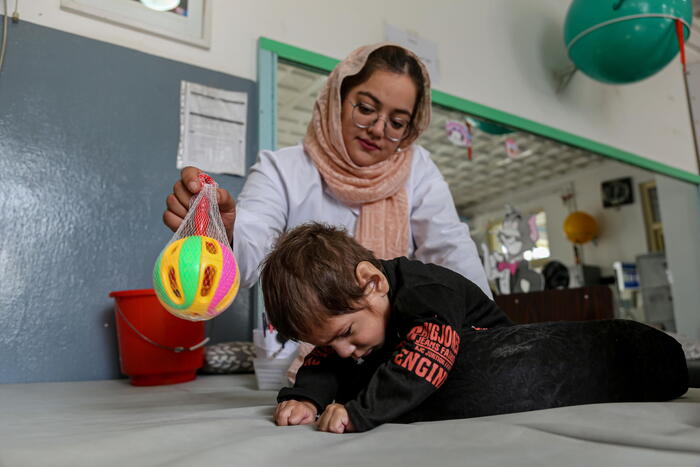Bavarian care officer in Türkheim: where exactly the shoe pinches in the care sector
Created: 01/05/2022, 07:35 AM
From: Marco Tobisch
Caregivers have been working at the limit for many months.
This became clear during a conversation in Türkheim.
© Christoph Schmidt / dpa
Unterallgäu / Türkheim - you help our loved ones through their hardest times. You take on tasks that would be uncomfortable even for close family members. And have at least received applause here and there since Corona has existed. But basically the problems in the care sector that existed before 2020 have remained. Ara Gharakhanian, head of the district senior citizens' homes in Unterallgäu, made this clear during a conversation in Türkheim using a few examples. On Monday, Gharakhanian had an exchange with MdL Bernhard Pohl and Peter Bauer, the patient and care officer of the Bavarian State Government, in the St. Martin district senior citizens' home.
The main problem in care: there is a lack of staff. This was also confirmed by Patricia Bader, director of the St. Martin home. The 133 spaces that would theoretically be available to residents in Türkheim cannot currently be used to full capacity. Eleven beds are currently empty. In order to be able to fill them again, the district would have to fill at least five full-time positions in nursing, estimates overall manager Gharakhanian. As Bader knows from conversations with colleagues from other homes, the problem is "widespread" and has been for a while. “Why hasn't politics done anything in the last 25 years?” Asks Gharakhanian.
Incidentally, the lack of staff cannot be related to money, as the head of the district senior citizens' homes explains. “No nurse has given us notice because of poor pay.” The nurses are remunerated in accordance with the public service collective agreement (TVöD-P). Among other things, Gharakhanian sees the poorly adjusted personnel key as the cause of layoffs, which means that the workload for the individual employee is enormous - and not only in the nursing professions, by the way. For the caretaker, too, the range of tasks is growing almost daily thanks to new requirements in fire protection or in the area of security. Gharakhanian regrets that he is not allowed to hire another caretaker because of the personnel key. In addition, at least half of the staff must be made up of skilled workers. A circumstancealso denounced by the deputy director of the home, Stefanie Santa. “Even with a skilled worker quota of 40 percent, the quality wouldn't suffer,” Ara Gharakhanian is convinced. And especially in times of pandemic, which would have significantly exacerbated the strain on employees, additional hands in care would be of great help.
Nursing officer Peter Bauer (3rd from left) and Member of the Bundestag Bernhard Pohl (2nd from right) were guests of the Free Voters in Türkheim.
They exchanged ideas with Ara Gharakhanian (right), head of the district senior citizens' homes, as well as Stefanie Santa (left) and Patricia Bader (2nd from left) from the St. Martin home.
© Tobisch
MdL Bernhard Pohl now wants to take up that too.
“When it comes to standards, we can do the most in terms of national politics,” said the Free Voter MP.
Another fact that Pohl took away from the talks was the image problem of care.
“You don't get anyone into a job if everyone pity them.” That is also a matter of work.
The participants in the discussion agreed that there is a compulsory vaccination for health workers, which has already been decided by the Bundestag and which is to come into force in mid-March, is counterproductive.
Patricia Bader explained: "The subject of vaccination is important, but we also have some employees who have decided against it." Currently, the vaccination rate among employees in St. Martin is 70 percent, and 90 percent among residents.
Ara Gharakhanian also made a clear statement on the subject of compulsory vaccinations: Introducing this for an industry that is already battered would be “fatal and almost negligent”.
In addition, it hardly provides any additional protection, since the employees test themselves daily.
Big hurdles for help from abroad
Homes across Germany fear that the shortage of staff will be exacerbated by mandatory vaccinations. Even nurses from abroad could only alleviate this need to a limited extent, as became clear during the conversation in Türkheim: The age limit was set too low for FSJ students and the inadequate integration process for auxiliary workers from abroad often meant that the employees would not stay long. And as Stefanie Santa emphasized, an offer for accommodation should also be made for assistants from abroad.
Nursing officer Peter Bauer also took these points with him.
He also presented his view of things, for example with a view to the increasing importance of work-life balance and the associated problems in shift work.
The “carer for patient and nursing staff”, as Bauer calls himself, now wants to bring what he has heard from Türkheim to Munich - but also emphasized that the EU or the federal government are also required to find solutions, for example in the case of a shortage of skilled workers.
Corona-technically routine has returned
After all, after the sometimes difficult Corona weeks, everything is now back to normal in St. Martin.
At the beginning of the pandemic, some relatives would have rebelled in view of the requirements for visits, with the ban on visits a good year ago, residents then went on the barricades.
In the meantime, however, the 3G checks (plus test under supervision) have worked well for visitors.
Gharakhanian wants to clear up one aspect in this context: "The ban on visits did not lead to social isolation." After all, many joint activities continued in the house.
Marco Tobisch








